- Home
- Raymond E. Feist
Murder in LaMut: Legends of the Riftwar: Book II Page 5
Murder in LaMut: Legends of the Riftwar: Book II Read online
Page 5
Kethol didn’t mind the Tsurani having tried to kill him–that was business–but he took damage to a forest personally, and neither Durine nor Pirojil had raised a word of objection; they had just helped him shovel in the soil. He had no regrets, but burying a man alive wasn’t the sort of thing that he really wanted to mention to a pretty woman, much less a pretty noblewoman, not when she was flirting with him.
Which she clearly was.
That was probably just to make Baron Morray jealous, but that was fine with Kethol. His sleep would be warmed by thoughts of her this night, and if she slept under Baron Morray that did Kethol no harm.
Still…
They broke at midday for a skimpy meal of cold bread and sausage, washed down with water and a gillful of cheap wine for the soldiers, while the nobles shared a glass bottle of something finer.
Pirojil would have had the Tsurani ex-slaves water and feed the horses–they seemed well-tamed, after all, and didn’t quite get the notion that they were now free–but Tom Garnett had a different idea: as usual, one man from each squad was detailed to see to the animals of that squad, while the others ate and rested. There was little enough time to take your ease when you were on patrol, and it made sense to get what rest you could.
Pirojil didn’t argue. He just let Kethol take his turn seeing to their three horses, while Pirojil ate his bread and sausage quickly enough to avoid tasting it, then drank his wine even more quickly. It warmed him a little, as he huddled in his cloak against the cold.
Even so…
‘I’d best go see about watering something that needs watering,’ he said to Durine, as he slung his swordbelt over his left shoulder, then stalked off over the crest of the hill to relieve himself.
Below, one of the regulars, a lanky man with a bald patch on his scalp where a Bug had nicked him, took out a set of pipes, and another a small drum, and soon off-key renditions of old martial songs filled the air.
‘We are marching on Bosonia, Bosonia, Bosonia,
‘We are marching on Bosonia, Bosonia, today…’
The Tsurani, as usual, seemed confused. Presumably, in the Empire, soldiers didn’t sing or drum unless ordered to do so. They probably didn’t fart unless explicitly instructed. These former slaves would find things much looser in service to the local nobles and franklins.
Pirojil’s lips tightened. The Tsurani were even worse than were the Kingdom regulars when it came to showing individuality. What was there about a regular soldier’s life that robbed him of any initiative?
He relieved himself quickly behind the broad bole of an ancient oak, while above a squirrel chittered at him. As he buttoned up his trousers, it was only a matter of reflex to check that the hilt of his sword was near his hand.
A twig snapped behind him, and his sword was no longer simply near his hand, but in his hand as he spun about to face–
Durine, a smile playing across his broad face, both hands up, palms out. ‘Stand easy, Pirojil,’ he said. ‘I guess I should have cleared my throat instead of stepping on a twig.’
Pirojil had to laugh. Snapped twigs as warnings of impending attack were a staple of late-night, campfire stories. For the most part, twigs bent and didn’t make any noise, except in the driest times of the year. Besides, in real life, an enemy was rarely considerate enough to give a warning before an assault: it kind of ruined the whole idea of a surprise attack.
Pirojil replaced his sword. They might be friends and long-time companions, but Durine’s hand never strayed far from the hilt of his own sword until Pirojil finished resheathing. Some habits were hard enough to break that they probably weren’t worth breaking.
‘Excuse me,’ Durine said, politely turning his back as he unbuttoned his own trousers.
A stream of piss steamed and smoked in the chilly air for an improbably long time.
‘With all the places to relieve yourself,’ Pirojil said, ‘did you really need me to be a witness?’
Durine buttoned his fly. ‘Well, truth be told, I always do prefer to have you or Kethol at my back when I’m occupied handling something this large and delicate, but no, I figured we ought to talk.’
‘So, talk.’
Durine shook his head. ‘I don’t like any of this. Playing bodyguard to an officer is one thing–you don’t have to worry about your own soldiers trying to knock him off–’
Pirojil’s eyebrows rose and he gave Durine a fish-eye.
‘All right, you usually don’t have to worry about your own soldiers trying to knock him off, just about enemy troops bothering him while he’s busy running a battle. I like doing bodyguard stuff.’ He patted his waist.
Pirojil nodded, though he did not meet the other’s gaze. It wasn’t that he was unwilling to. It was just a reflex for him, after all this time, with both Kethol and Durine: they automatically divided the world into fields of fire; it had saved their lives more than several times.
‘I know,’ Pirojil said. Bodyguard duty usually meant some extra coins, and the meals tended to be better, and while you were near enough the front not to get bored, you were also not so close that you had to worry about somebody leaping out at you while you were harvesting a bit of loot. ‘Not the sort of thing I would have volunteered for, but I don’t remember being asked to volunteer, do you?’
‘So why us?’
‘I don’t know, although I have some ideas. For whatever they’re worth.’ Pirojil shrugged. ‘I don’t think it’s because the Swordmaster thinks we’re better than his own troops.’
‘We are.’
Pirojil couldn’t help but grin. ‘Well, I think that, and you think that, and Kethol thinks that we’re better than they are–but I’m willing to bet that the locals don’t think we are.’
‘Their problem.’
‘No. Our problem. What we are is uninvolved, which is good.’
‘Good?’
‘Good for us. We’re not expected to take sides in local rivalries, which means that we can expect not to have our throats cut for making the wrong move at the wrong time.’
‘So you like this?’
‘I didn’t say that. The bad part is that we’re uninvolved–’
‘You said that was the good part.’ Sometimes Durine was just too slow. Not that Pirojil would complain; Kethol was worse.
‘It’s good and bad,’ Pirojil said slowly, patiently. ‘Most things are. The bad has two parts: someone might try to cut our throats for just being in the way.’
‘Nothing new in that.’
‘And we’re expendable.’
‘Nothing new in that, either.’
‘More so than usual.’
‘Ah!’ Durine nodded, finally understanding. ‘Politics.’ He said it as if it was a curse.
‘Politics.’ Pirojil nodded. ‘Look at it from the political angle. If Baron Morray, say, falls down a flight of stairs and breaks his neck, the Earl can either treat it as an accident, or as our fault. If it’s an accident, well then, there’s no political problem, and Luke Verheyen isn’t to blame–nobody is.’
‘And that’s a good thing, isn’t it?’
‘Sure. But if it’s not an accident–if, say, the Baron was murdered–then whose fault is it?’
‘The murderer’s?’
Pirojil wasn’t sure whether to groan or laugh. ‘Sure: the murderer. And who is the murderer? Verheyen, the hereditary enemy, who is eyeing the earldom every bit as much as Morray is? Or the three freebooters who, upon a careful search, will of a certainty seem to have too much money on them?’
‘So what do we do?’
‘The obvious: we try to keep Baron Morray from falling off his horse and breaking his neck while we’re on patrol, or falling down the stairs and breaking his neck when we’re at Morray and Mondegreen. We get him back to LaMut intact and breathing, and hope to be relieved of this duty there. If somebody tries to kill him, we stop them; if we can’t, we be sure to capture at least one assassin alive, and make sure he is able to tell who paid him, which won’t have been us.’
‘And if we can’t?’
Pirojil just frowned at him. That was obvious. ‘We kill everybody within reach, grab their horses and anything of value they have on them, and then we see if we can outrace the price on our heads.’
‘And what do you think are our chances of that?’
‘Sixty-sixty–’
‘Optimist.’
‘–on a good day.’ Pirojil arched an eyebrow. ‘If you have a better alternative, don’t sit on it–trot it out and let’s talk about it.’
Durine shook his head. ‘No. I’ve no better idea, and that’s a fact.’
‘Then we go with–’
‘Mount up,’ sounded from below. Tom Garnett’s voice carried well. ‘We’re wasting daylight.’
‘We’d better get down before they leave without us,’ Pirojil said.
‘Yes, I suppose so.’ Durine nodded, and his massive brow wrinkled. ‘But I see what you mean. Very clever of the Swordmaster, eh?’
‘Eh?’
‘I mean, if somebody does manage to kill Baron Morray out here, or if he does have a fatal accident, wouldn’t the Swordmaster know that we’d be blamed and would have to run for it?’
‘Well, yes.’
‘So he wins either way.’
Pirojil had to nod. The Swordmaster would win, either way, at that. A dead baron wasn’t an insuperable problem–the war had been almost as lethal for the nobility as it had been for the common soldier–but feuding barons getting the idea that assassination was acceptable was another thing altogether. Much better to blame the three freebooters, who had had no connection with any nobility faction. Someone would make it obvious they had just decided to kill and rob the Baron themselves–and whether Pirojil, Kethol and Durine were killed, captured, or escaped was immaterial; that’s what the official story would be.
Maybe Durine wasn’t really so stupid after all.
The Swordmaster surely wasn’t.
Shit.
They were only an hour south of Mondegreen when the Tsurani attacked.
There was no warning, at least none that Durine noticed, not even in retrospect. Neither Kethol nor Pirojil had any, or they would have given a signal.
One moment the company was riding, in two ragged columns, down a farming road, a frozen, fallow field of hay on each side, and the next moment, dozens of black-and-orange-armoured soldiers were swarming out of the ditch where they had lain, hidden beneath a layer of hay.
Durine spurred his horse into the soldier who, broadsword in his hands, was making for Morray. The horse ploughed into the Tsurani, knocking him down, while Durine leapt to the ground on the far side.
That was the trouble with being mounted. You were too dependent on the movements of the horse, and with anything but a superbly trained warhorse under you that was hopeless. Durine needed solid ground beneath his boots if he was going to stay and fight, and he was going to stay and fight.
He leapt back to avoid a wild swing from another Tsurani swordsman, then lunged forwards, kicking at his deceptively fragile-looking breastplate while hacking down at another opponent.
There were shouts and screams of pain all around him, but Baron Morray was still on his horse, and Durine slapped the flank of the mare with the flat of his blade, sending the animal galloping down the road with the Baron clinging desperately, towards where Kethol and Pirojil were still mounted.
It was always tempting to underrate the locals–a professional mercenary, if he lived, survived far more fighting than all but the most seasoned Eastern soldiers, and far more than Westerners–but Tom Garnett was no green captain, eager to fall into a Tsurani trap: he was already leading the front of the column out onto the field, attempting to outflank the attackers quickly, and not simply galloping into the secondary ambush that almost certainly waited for the company down the road.
Durine found himself awash in a sea of orange-trimmed black armour. He lashed out with feet, sword, and his free fist, hoping to clear enough space to make his own escape before he was drowned in Tsurani.
He more felt than saw or heard Pirojil at his back, and moments later, Pirojil was joined by half a dozen lancers, who had apparently circled around to strike at the Tsurani from the rear.
One horseman impaled a screaming Tsurani on his lance, lifting him up and off the ground for a moment, until his lance snapped with a loud crack. Flailing wildly with the broken haft of his lance, the Mut managed to club several of them away before one leapt upon him from behind and bore him down to the ground.
Durine would have tried to go to his aid, but he was busy with two of the Tsurani himself. He kicked one towards where Pirojil had dismounted–Pirojil had just dispatched his latest opponent, and could handle an off-balance soldier easily–then he ducked under the wild swing of another Tsurani’s two-handed black sword, and slashed in and up, into and through the smaller man’s throat.
Blood fountained, as though he had pulled the bung out of a hogshead of crimson wine.
The look in the eyes of a man you were killing was always the same. This can’t be happening to me, it said, in any language. Not me. Durine had often seen that expression on the face of a man who was facing the imminence of becoming a thing, and he didn’t need to see it again; he kicked the dying man away.
Three Tsurani hacked at the legs of a big grey horse, sending horse and rider tumbling to the ground as the animal screamed in that strange, high-pitched horsy shriek that you never could get used to. But one of them miscalculated: as the horse fell, it fell on the Tsurani, crushing him in his black armour with a sodden series of snapping sounds.
It was all Durine could do not to laugh.
The Tsurani were, as always, determined and capable warriors, but they were outnumbered, and lying for hours in ambush in the bitter cold had slowed them down: it was only a matter of a few minutes until most of them lay on the ground, dead and dying.
The screams were horrible to hear.
Durine half-squatted, panting for breath. No matter how long you had been doing this, it still always took something out of you.
One of the Tsurani on the ground near Durine was still shrieking loudly. A wound to his groin that still oozed fresh, steaming blood onto the frozen ground. Durine straightened himself and walked over, then hacked down, once, at the back of the Tsurani’s neck. The man twitched once, and was still, save for the flatulent sound as he fouled himself in his death.
Sudden death was rarely dignified.
‘Wait.’ Tom Garnett dismounted from his horse and braced Durine. ‘We take prisoners when we can. That man could have been one of the slaves that the Tsurani keep, and be of no danger to us at all.’
Durine didn’t answer.
‘Well, man, did you hear me?’
‘Excuse me.’ Pirojil stepped between them. ‘I think you might want to see something, Captain,’ he said, kneeling over the dead man and turning him on his back. The Tsurani’s head flopped loosely where it was still attached to the body.
Pirojil stood, toeing away a dagger from the Tsurani’s hand. He waved at the dead Tsurani and said, ‘Perhaps, Captain, you would not have wanted to have your last thought to be that your mercy had been misplaced.’
Durine hadn’t seen any dagger, and it wouldn’t have mattered. The Tsurani was dying, anyway, and it hardly made any difference whether he went on his way now, or in a few minutes. At least this way his screams wouldn’t aggravate Durine’s headache.
They would be bad enough to face in his dreams.
The regulars had two sullen Tsurani prisoners, their hands tightly bound and then leashed by the neck, under the care of a pair of lancers, although that was hardly necessary, as they weren’t struggling. Captured Tsurani were either utterly intractable, and you eventually had to kill them, no matter how many times you beat them bloody, or how well you treated them while they were chained heavily enough to control them–or utterly tame. One of the locals had tried to explain to Durine that this was something to do with Tsurani honour: if captu
red, they assumed the gods cursed them or some nonsense like that; but Durine knew that once they gave up, they seemed resigned to spend the rest of their lives as slaves. Durine didn’t understand, and he didn’t particularly want to; where to put a sword in one was about all he needed to know. Though he did recall one of the Muts telling him the black-and-orange ones were called Minwanabi, and they were a particularly tough and evil bunch of bastards. Durine shrugged and walked away. He didn’t plan on staying in the north long enough to discover what the other tribes were named or how evil they were. All Tsurani seemed tough enough.
The two tame ones were the only survivors among the Tsurani, though. Easily two dozen of the enemy lay dead on the ground, accompanied in death by four Muts and two horses. One soldier wept as he knelt over his horse, feeling at its neck to be sure that its heart had stopped beating.
Silly man. Getting so attached to something made of meat. Meat died and spoiled.
Lady Mondegreen and Baron Morray sat on their horses, overlooking the scene. Baron Morray’s handsome face was impassive, if a little pale, but the lady’s complexion was almost green, and she was distracted enough to wipe a trickle of vomit from the corner of her mouth with her sleeve instead of her handkerchief.
‘I’ve…I’ve never seen a battle before,’ she said, quietly.
‘Battle?’ Baron Morray shook his head. ‘This was barely a skirmish.’
‘What are they going to do with them?’ she asked.
‘Leave it to the landholder,’ he said. ‘It will be his responsibility.’
Durine nodded. Just as well it wasn’t Durine’s job to break the frozen soil and bury the bodies; that would be long and hard work, but it was somebody else’s problem–disposing of the corpses would be for the local landholder or franklins to do, depending on whose field this was. The Mut soldiers would be wrapped in blankets and carried along to be given a proper cremation at Mondegreen. The Tsurani would probably end up fertilizing the fields.
It was all dirty work, certainly, but if the locals got to the scene quickly enough–and they would–there would be a couple of hundredweight of fresh horsemeat as payment for their work. An ignominious thing, perhaps, for a trusty mount to end up in a peasant stew, but that was the way of it.

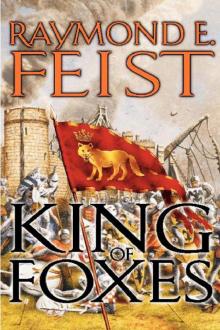 King of Foxes
King of Foxes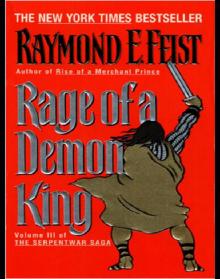 Rage of a Demon King
Rage of a Demon King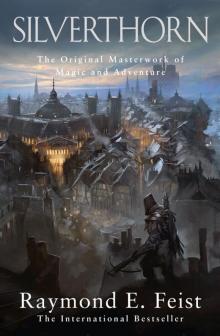 Silverthorn
Silverthorn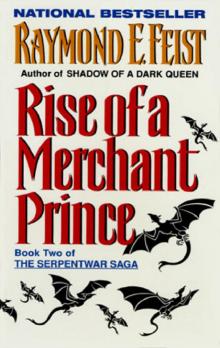 Rise of a Merchant Prince
Rise of a Merchant Prince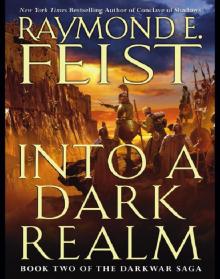 Into a Dark Realm: Book Two of the Darkwar Saga
Into a Dark Realm: Book Two of the Darkwar Saga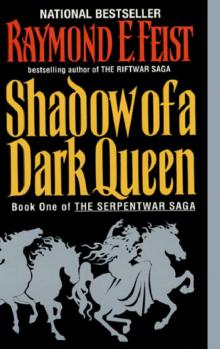 Shadow of a Dark Queen
Shadow of a Dark Queen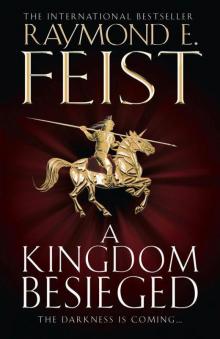 A Kingdom Besieged
A Kingdom Besieged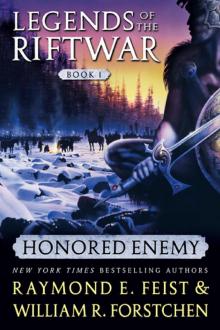 Honored Enemy
Honored Enemy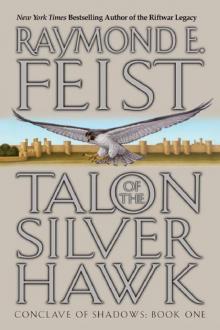 Talon of the Silver Hawk
Talon of the Silver Hawk The Complete Legends of the Riftwar Trilogy
The Complete Legends of the Riftwar Trilogy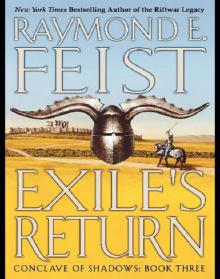 Exile's Return: Conclave of Shadows: Book Three
Exile's Return: Conclave of Shadows: Book Three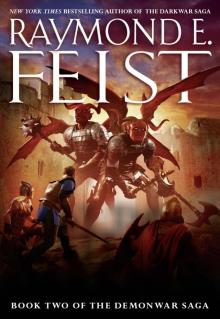 At the Gates of Darkness
At the Gates of Darkness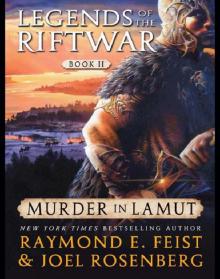 Murder in LaMut: Legends of the Riftwar: Book II
Murder in LaMut: Legends of the Riftwar: Book II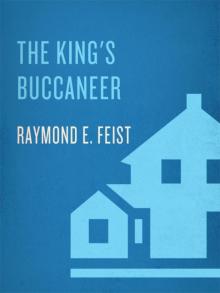 The King's Buccaneer
The King's Buccaneer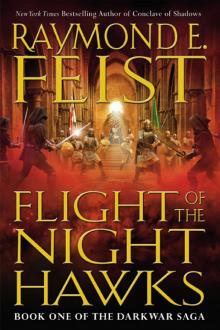 Flight of the Nighthawks
Flight of the Nighthawks The Riftwar Saga
The Riftwar Saga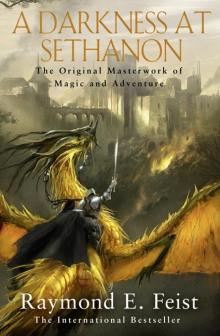 A Darkness at Sethanon
A Darkness at Sethanon Magician: Master
Magician: Master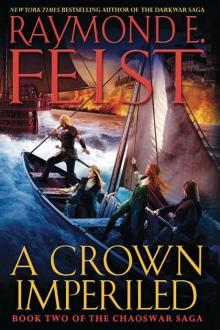 A Crown Imperiled
A Crown Imperiled Magician: Apprentice
Magician: Apprentice Midkemia
Midkemia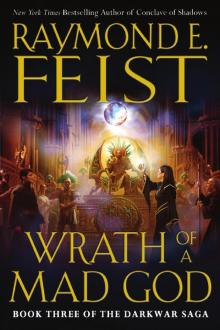 Wrath of a Mad God
Wrath of a Mad God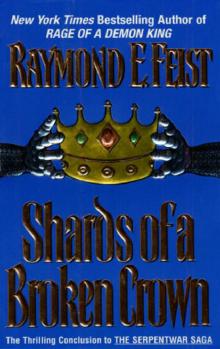 Shards of a Broken Crown
Shards of a Broken Crown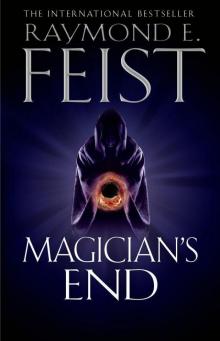 Magician's End
Magician's End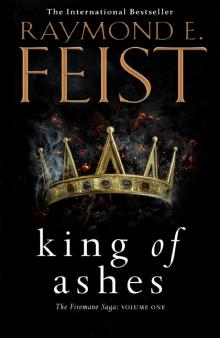 King of Ashes
King of Ashes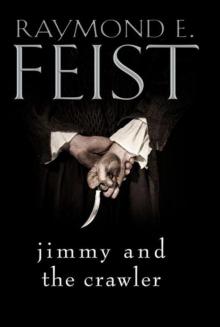 Jimmy and the Crawler
Jimmy and the Crawler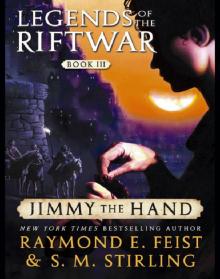 Jimmy the Hand: Legends of the Riftwar, Book 3
Jimmy the Hand: Legends of the Riftwar, Book 3 Queen of Storms
Queen of Storms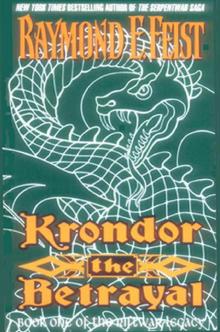 Krondor: The Betrayal
Krondor: The Betrayal Magician
Magician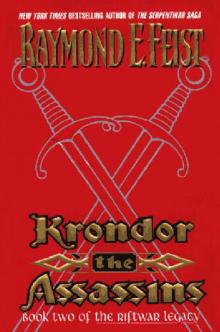 Krondor: The Assassins
Krondor: The Assassins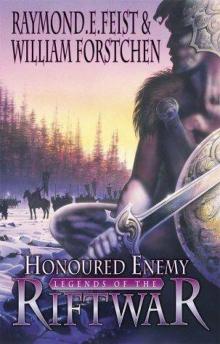 Honoured Enemy
Honoured Enemy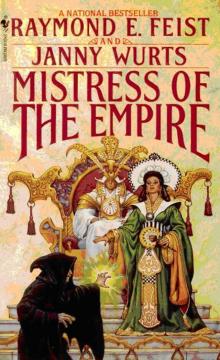 Mistress of the Empire
Mistress of the Empire The Complete Empire Trilogy
The Complete Empire Trilogy Legends 1 - Honoured Enemy
Legends 1 - Honoured Enemy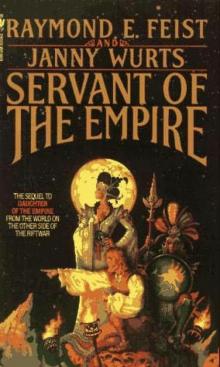 Empire - 02 - Servant Of The Empire
Empire - 02 - Servant Of The Empire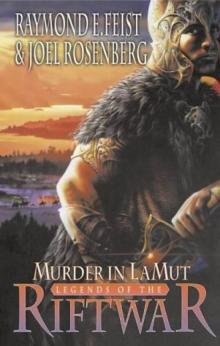 Murder In LaMut
Murder In LaMut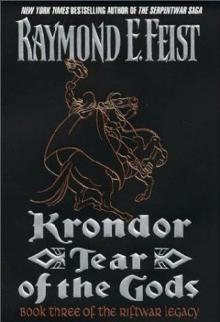 Krondor Tear of the Gods
Krondor Tear of the Gods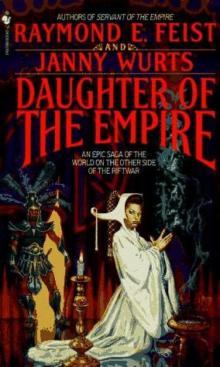 Empire - 01 - Daughter Of The Empire
Empire - 01 - Daughter Of The Empire![King of Ashes [Book One] Read online](http://i1.bookreadfree.com/i1/03/30/king_of_ashes_book_one_preview.jpg) King of Ashes [Book One]
King of Ashes [Book One]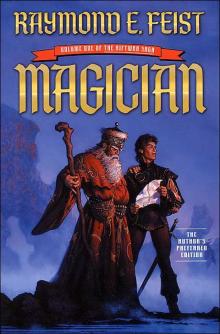 Magician (10th Aniversary Edition)
Magician (10th Aniversary Edition)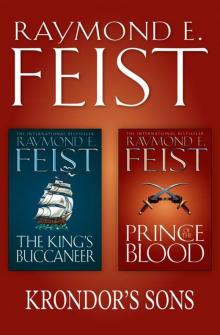 Prince of the Blood, the King's Buccaneer
Prince of the Blood, the King's Buccaneer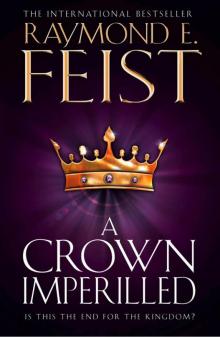 A Crown Imperilled cs-2
A Crown Imperilled cs-2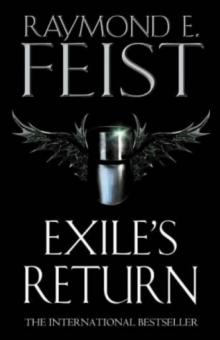 Exile's Return
Exile's Return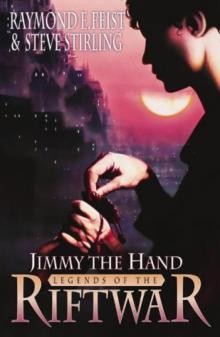 Jimmy the Hand
Jimmy the Hand Book 1 - Magician
Book 1 - Magician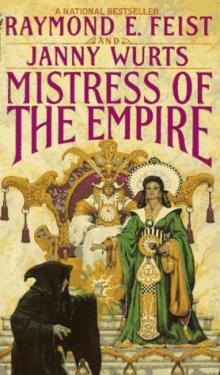 Empire - 03 - Mistress Of The Empire
Empire - 03 - Mistress Of The Empire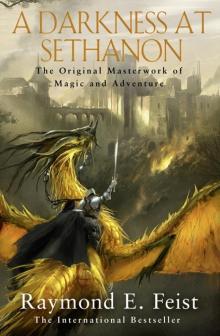 Darkness at Sethanon
Darkness at Sethanon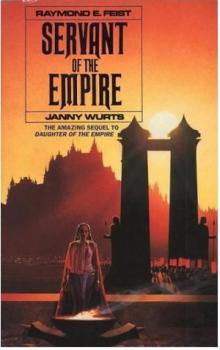 Servant of the Empire
Servant of the Empire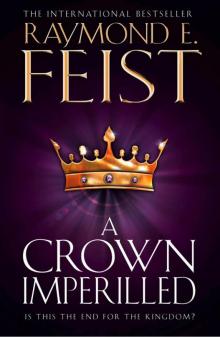 A Crown Imperilled
A Crown Imperilled Rides a Dread Legion
Rides a Dread Legion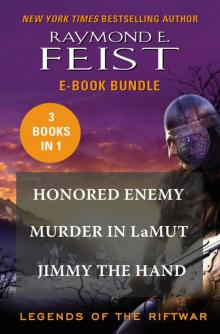 Legends of the Riftwar
Legends of the Riftwar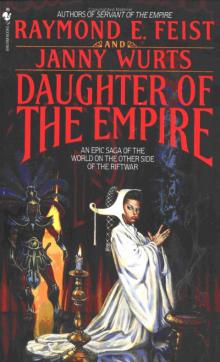 Daughter of the Empire
Daughter of the Empire The Riftwar Saga Trilogy: Magician, Silverthorn and A Darkness at Sethanon
The Riftwar Saga Trilogy: Magician, Silverthorn and A Darkness at Sethanon